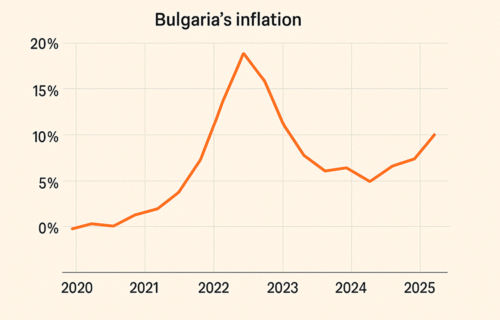After several months of relative calm, Bulgaria’s inflation rate rose to 5.6 % in September 2025, its highest level since the beginning of the year. The increase, confirmed by the National Statistical Institute (NSI) and multiple economic outlets, reflects renewed cost pressures across key consumer sectors even as prices fell slightly on a month-to-month basis.
Compared with August, consumer prices in September dropped by 0.8 %, but the year-on-year data shows a clear uptick from the 5.3 % recorded the previous month. The NSI report highlights that education costs jumped by 4.5 % and clothing by 1 %, while the biggest declines were seen in recreation, restaurants, and food prices.
Bulgaria’s Harmonised Index of Consumer Prices — used for EU comparisons — shows a milder annual rise of 4.1 %, suggesting that domestic inflation is running ahead of broader European trends. From January to September, prices rose by about 3.4 % in total, while the average inflation for the past 12 months stood at 3.8 %.
This marks a noticeable shift from last year, when inflation cooled to around 2.4 % after a turbulent period. The 2025 rebound, though still modest compared with the double-digit surge of 2022, signals that inflationary forces are proving difficult to tame.
In historical context, the current rate remains moderate: consumer prices grew by just 1.2 % in 2020, 3.3 % in 2021, and then spiked dramatically to more than 15 % in 2022 amid soaring energy and food costs. The following year brought relief as inflation dropped to around 9 %, and by 2024 it appeared largely under control.
Economists say this year’s rise reflects a mix of domestic and external factors — from higher service costs and wage pressures to the lingering impact of global food and energy markets. While Bulgaria’s inflation is still well below the levels that once gripped its economy, the September figures suggest that price growth remains stubbornly above the comfort zone for both consumers and policymakers.
The government and central bank are now watching closely to see whether this latest acceleration proves temporary or marks the start of another inflationary wave. For Bulgarian households, it is another reminder that while the pandemic-era shock may have passed, the era of cheap living has not fully returned.
